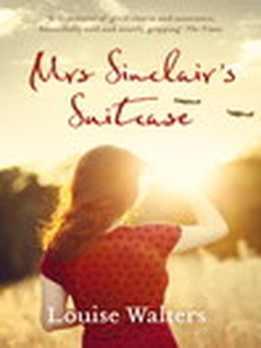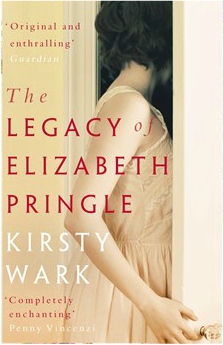I know that a novel written in the form of letters is known as an epistolary novel, but is there a word for a novel that starts with an intriguing letter and then goes on to portray the lives of the letter writer and its intended recipient? I’m asking because two novels I read recently followed that format and I’d like to tell you a little about them.
I’d love to hear your views and, if you do wish to reply, you can do so in the comments box below.
With all best wishes,
Annecdotist.

The first is a letter from Jan Pietrykowski, written in 1941, ending his relationship with Dorothea because he disapproves of something she’s done. Roberta has found this letter in an old suitcase belonging to her hundred-and-ten-year-old grandmother, Dorothea, now residing in a nursing home. She’s never heard of Mrs D Sinclair, whose name is inscribed in the suitcase, but Jan Pietrykowski is her paternal grandfather, dead before Roberta’s father was born. Otherwise the letter makes little sense to the reader, or to Roberta, especially as it contradicts what she’s been told about the family narrative. It takes the rest of the novel for her to come anywhere near to approaching the truth.
Dorothy/Dorothea is a wonderful character: an ordinary woman who discovers enormous reserves of strength when put to the test. Roberta’s ordinariness is less enchanting as it is her passivity that feeds the narrative tension as she hides from life among the bookshelves. But, as I’ve said before, lots of real-life people are not particularly driven, and I admire a writer who can represent this on the page.
Mrs Sinclair’s Suitcase is about love and loss, about motherhood and missed opportunities against the backdrop of the Second World War. The secret at its heart is neither particularly shocking nor difficult to guess, but it’s a warm-hearted story and an engaging read. If I was disappointed, it was because, from the publisher’s positioning of the novel as literary fiction, I was expecting something more challenging in content or style. Nevertheless, it’s a fine debut novel – thanks to Hodder for my review copy. For my reviews of other novels about women’s experience in World War II see I Can’t Begin to Tell You; Those Who Save Us; The Undertaking.

It took me a while to warm to this novel; a good hundred pages, in fact. I balked at the unnecessarily detailed descriptions and even I, unsociable as I am, found it hard to credit that someone would pop a letter through a stranger’s letterbox asking for first option if the house came up for sale, without ever attempting to engage the owner in conversation. Like Mrs Sinclair’s Suitcase, The Legacy of Elizabeth Pringle is flagged by the publishers as literary and seemed, initially at least, stuffed with those aspects of literary fiction its detractors so love to parody: slow pace; overblown similes; and attitudes and feelings ascribed to inanimate objects. It could be that I was being overly harsh because I’m guilty of similar crimes against good writing myself or because the author, Kirsty Wark, is well known in Britain as a presenter of a flagship TV news programme, and I’m always suspicious that celebrities don’t have to work as hard at their writing to get published.
But warm to it I did and, when the author settled into her story or I settled into her style, I found it an engaging exploration of twentieth century women’s lives alongside the landscape and history of that corner of Scotland. Like Dorothy/Dorothea in Mrs Sinclair’s Suitcase, Elizabeth Pringle is an unconventional woman facing some difficult choices in her determination to be true to herself. She becomes a dedicated gardener and inspiring schoolteacher and, in old age, a good friend to two much younger men. Martha Morrison confronts sibling rivalry and her mother’s dementia, alongside giving up her journalistic career. I was about to conclude that this is a bighearted novel of romance and regret, about mothers and daughters and the conflict between different types of love. Yet my sympathy waned once more with the ending which, although credible, seemed overly sensational and sentimental. While novels can occasionally move me to tears, I hate being told what to feel, leaving me with a sense of a debut novelist trying too hard to be literary.
Thanks to publishers Two Roads for my review copy.
For one of my own short stories told in letters, see Bathroom Suite.





















 RSS Feed
RSS Feed





















